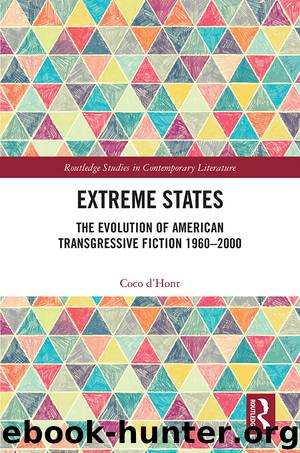Extreme States by Coco d'Hont

Author:Coco d'Hont
Language: eng
Format: epub
Publisher: Taylor & Francis (CAM)
Published: 2019-06-15T16:00:00+00:00
Half-Formed Things: Building Gendered and Ethnic Identities
Beloved demonstrates that transgression does not only cross existing boundaries, such as the one between past and present, to problematize power relationships that are already in place. By focusing on Sethe’s transforming family and its place in a wider social environment, the novel explores how transgression constructs new identities and communities. Crucially, this form of transgressive (re)construction does not occur in opposition to, but together with, the “monsters” and “ghosts” from the past. It also differs from the uncontrolled movements Sethe and her family were subjected to as slaves and presents transgression as a much more active, conscious process of identity formation. Beloved describes identity as a communal construction rather than an individual possession, highlighting how the relationships and interactions between characters shape how they view themselves as individuals and as part of what Benedict Anderson refers to as an “imagined community” (6). After depicting the destructive effects of Sethe’s transgressions of the limits of Sweet Home and the schoolteacher-imposed rules that govern it, Beloved proceeds to explore the potential of transgression to function as a constructive movement that creates new forms of individual and communal living through the reconsideration of social limits and the establishment of new connections.
The novel adopts a “decidedly womanist perspective” (Beaulieu 59) in its descriptions of Denver’s reaching out beyond the strict limits of her isolated family, using the depiction of emerging female relationships to build “structures of inclusiveness and positive interrelationship from anywhere in its network” (Phillips xxv). The novel echoes Phillips’s more extensive description of womanism as “a social change perspective rooted in Black women’s and other women of color’s everyday experiences and everyday methods of problem solving in everyday spaces, extended to the problem of ending all forms of oppression for all people” (xx). Moving beyond the confined environment of Sethe and Beloved’s mother-daughter relationship, Beloved studies how Denver begins to reach out and form relationships with a wider community of women she has so far been isolated from. Connection and community become an antidote to the isolation caused by Beloved’s arrival and her mother’s deteriorating mental health. Importantly, the first person Denver visits is Lady Jones, who runs a school for impoverished African-American children. Lady Jones is an outcast due to her mixed background, causing her neighbours to lament “all that yellow gone to waste” and call her “white nigger” (291). Through its description of the growing friendship between Lady Jones and Denver, the novel highlights the prejudices that exist within the African-American community itself, demonstrates how the study of the intersections between race and gender can be used to undo these prejudices and traces how a new community can be formed through the transgression of social limits.
Denver’s discovery of her own place within the community questions and reforms the limits of that community in return. Because she once occupied a “marginal” status as a woman with an unusual occupation and complex racial background, Lady Jones feels sympathy for Denver. She is one of the
Download
This site does not store any files on its server. We only index and link to content provided by other sites. Please contact the content providers to delete copyright contents if any and email us, we'll remove relevant links or contents immediately.
| African | Asian |
| Australian & Oceanian | Canadian |
| Caribbean & Latin American | European |
| Jewish | Middle Eastern |
| Russian | United States |
4 3 2 1: A Novel by Paul Auster(12377)
The handmaid's tale by Margaret Atwood(7757)
Giovanni's Room by James Baldwin(7330)
Asking the Right Questions: A Guide to Critical Thinking by M. Neil Browne & Stuart M. Keeley(5762)
Big Magic: Creative Living Beyond Fear by Elizabeth Gilbert(5757)
Ego Is the Enemy by Ryan Holiday(5417)
The Body: A Guide for Occupants by Bill Bryson(5082)
On Writing A Memoir of the Craft by Stephen King(4936)
Ken Follett - World without end by Ken Follett(4723)
Adulting by Kelly Williams Brown(4567)
Bluets by Maggie Nelson(4548)
Eat That Frog! by Brian Tracy(4526)
Guilty Pleasures by Laurell K Hamilton(4440)
The Poetry of Pablo Neruda by Pablo Neruda(4098)
Alive: The Story of the Andes Survivors by Piers Paul Read(4023)
White Noise - A Novel by Don DeLillo(4006)
Fingerprints of the Gods by Graham Hancock(3996)
The Book of Joy by Dalai Lama(3976)
The Bookshop by Penelope Fitzgerald(3844)
